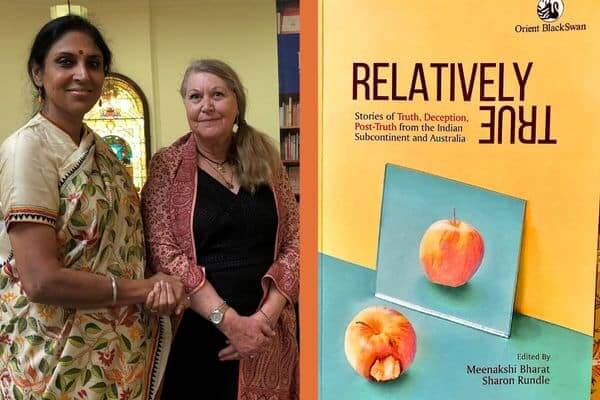Relatively True: Stories of Truth, Deception, Post-Truth from the Indian Sub-continent and Australia is the 5th in a series of anthologies of short fiction. Edited by Meenakshi Bharat and Sharon Rundle, this latest work once again captures the reader’s attention with short stories that not just resonate with their reflections of the human condition, but which reflect the agony of the times we live in.
The nuanced messages that come to life in each story hint at the futility of trying to discern truth in a world that is increasingly based on falsehoods and fictions – but where the lies and hypocrisy are seen as powerful constructs of a lived reality.
The key characters within the stories live the lie knowingly – yet use the justification and the rationale for the lie as acceptable for the outcome to be achieved – even though the outcome is rarely considered.
The short story Wrong Number by Mitra Phukan is a fabulous example. Maini, a simple village girl uses technology – her mobile phone – to live a fabricated, virtual life where she develops a phone relationship with a boy/man, who in turn thinks that Maini is a 40-year-old matron. As often happens, ultimately, there is a collision of the virtual world with the surprise of the reality, where a decision is to be made. In this particular short story however, there is a pleasing turn of events when Maini and Prem decide to meet up in real life, and Maini learns that Prem may not be who he has been professing to be (a 20-year-old college student), but an older gent with greying hair.
Instead of ghosting him, she accepts this with good spirits, and understands in that pivotal moment that Prem is now going to see that she is not an older lady herself. The story ends with Maini saying to Prem, “I have a surprise, for you, too.”
Another favourite was Flowers of Sorrow by Shirley Hazzard, which neatly exposes the doublespeak and weasel words that act as a cloak for corporate language. It is undeniable that corporations can be bad actors, and through the immense power ceded to them by people, recklessly abuse and misuse language to serve their own sinister motives. Showing off exactly what happens in corporations across Australia and possibly the world, Flowers of Sorrow demonstrates the petty foibles of the human condition in a corporate setting.
The truest phrase and most unimpeachable exchange in the story – and possibly the entire book – was this:
“You busy at present?” Mr Willoughby asked her.
“Oh yes,” she said. (It was a question which had never in the Organisation’s history been known to meet with a negative reply).
And this then, is the essence of the stories – the lies, the cant and obfuscation that serves as our new reality – and which form the core almost of being human. At the centre of it all, is our complacent acceptance of lies that serve as truth.
The short stories in this anthology don’t just resonate because they are a sign of the times we live in – where the public discourse around the power of technology in our lives obfuscates the truth of what is. They are appealing also because they help give shape to the ecosystem of our individual lives and larger world within the context of technology.
The stories sparkle with familiarity because at their core – regardless of the world we live in and technology that is pervasive in our lives – is the human condition, and what it means to know ourselves and to live our values – and the small part each of us plays in the overall condition of being human. And what it says of the human condition is this – that in serving and living the lie, we become lies ourselves – like bad data.
And we know this, and we accept it.
Just like Maini, we are ok with it.
Relatively True is published by Orient BlackSwan.
Read More: Book Review: The Escapades of Toby Turner by Vaibhav Mehra




